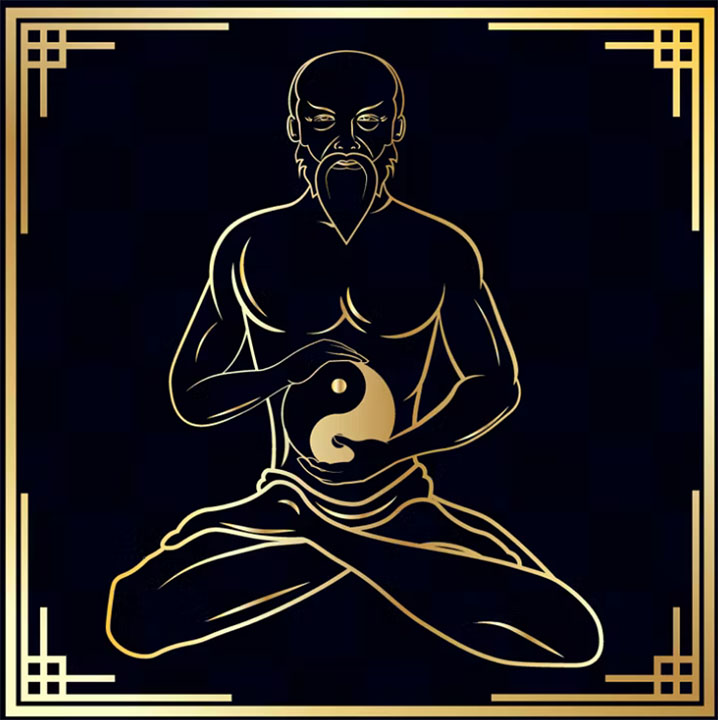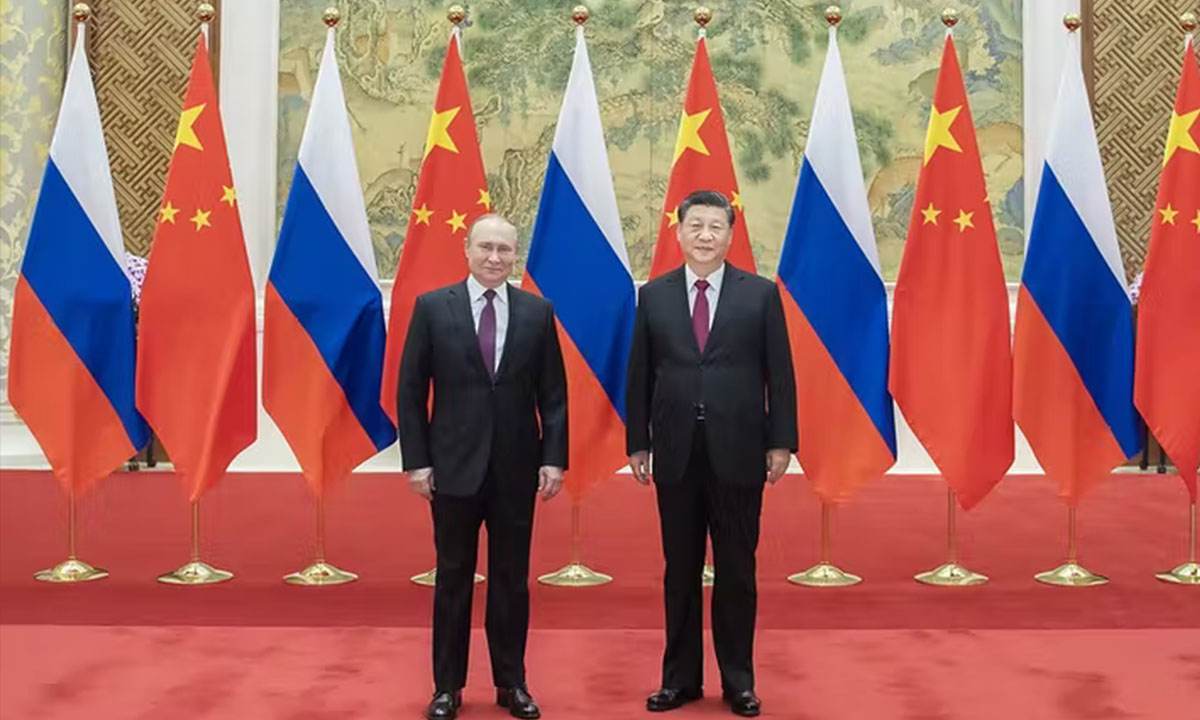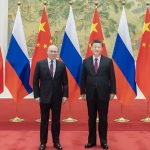人生在尘蒙 恰似盆中虫
终日行绕绕 不离其盆中…
Humans live in a blinding dust
like insects in a bowl.
All day we go around and around
and never get out of the bowl… (1)
Countries and people both aspire to be at the center of the narrative. In reality, and symbolically, it is always the center which controls the battle. Its symbolism is hard to avoid. Little wonder that China historically has called itself Zhōngguó 中国, the country of the center (Zhōng is center, and guó, country). Russia, for a variety of reasons, feels it has lost the center, and wants it back. But it has chosen the hardest path to do so, and in passing, has put China in an awkward position. Everyone is asking the same question: did China know that Russia would invade Ukraine?
The question is a pertinent one, because the answer will determine the nature of international relations for the foreseeable future.
There are two facts that seem to support the arguments of those who think that Beijing was aware of Moscow’s plans to invade its western neighbor. The first is that in recent months US intelligence had repeatedly warned the Chinese authorities of Putin’s intentions, but they were systematically rejected as unfounded.
Even hours before the invasion took place on February 24, Chinese Foreign Ministry spokeswoman Hua Chunying accused the White House of ratcheting up tension and creating panic about the possibility of war. Truth be told, the Chinese were well within their rights, because who believes the Americans today, bent as they are on seeing wars where there are none, and then once they have created them withdrawing after selling the weapons needed to fight them ?
The second fact is that on February 4, 20 days before the invasion, a Sino-Russian statement announced to the world amid great fanfare an alliance between two major nuclear powers, to the detriment of a third, the United States and its sleeping partner, the European Union. A fundamental part of the declaration was its staging: the two countries’ foreign ministers played a secondary role; it was the two leaders, Xi Jinping and Vladimir Putin, who made it clear that the rules of the international game had changed.
All this suggests that Beijing indeed knew what the Americans had suspected—and the rest of us refused to consider: that Putin would invade Ukraine.
Nevertheless, something still doesn’t add up.
Russians like to refer to the Hand of Moscow (Рука Москвы) when a story is so implausible as to defy the truth, but for that very reason is indeed true, because that’s how the KGB used to operate: make it look like they had not been involved, when everyone knew they had. Thus, Moscow’s hand was behind Trump’s win in 2016. And that hand must also have played a role in that grandiose staging, allowing Putin to simultaneously pass on the message that he was about to make a large military deployment, albeit one short of invasion. The immediate consequence of this strategy has been that the Chinese, who are not fond of having to make unexpected policy changes, have shifted from unconditional support simply to support, because they feel they have been deceived. The Chinese press described Moscow’s actions as a special military operation (特别军事行动), rather than an invasion, something which is contrary to its stated principles of non-interference in the internal affairs of sovereign countries. Since February 25 itself, one day after the invasion, this word, along with the word attack, or war, have also been banned in the Russian media, in what appears to be an attempt to sweep them away, to create an alternative reality for Russians, Will Putin lose Russia? Foreign Affairs magazine, March 3, 2022.
How to interpret Beijing’s initial decision to tell its 6,000 nationals in Ukraine to stay put and identify themselves by flying Chinese flags from their vehicles and properties at the same time as most of the world’s nations were telling their nationals to leave the country and readying the evacuation of their diplomats, only to change its mind two days later and advise them not to display any symbols that would reveal their origin, presumably so as to avoid retaliation from the Ukrainians, who now saw China as Moscow’s ally? Is it plausible that the Chinese government would abandon its citizens to their fate if it really thought their lives were at risk?
So what happened? Historically, in situations like this, each side tells their version of the events using the pieces of the puzzle they hold, placing them according to their perceptions and subjectivities, creating a partial picture (also known as the Rashomon effect). But there are always pieces, or cornerstones, without which the puzzle cannot be completed. In the case of this puzzle, the cornerstone was held by Moscow: nobody was counting on it invading Ukraine. Everybody else was trying to complete another puzzle, based on a different cornerstone, except, it would seem, for the Americans.
That said, surely the Chinese intelligence services, using their satellites, knew about the huge build-up of Russian troops on the Ukrainian border, along with the repeated warnings of their American counterparts. But data is only part of the story, what matters is how one interprets it. By and large, Chinese history and philosophy has ignored what goes on beyond its borders.
China has traditionally seen itself as the country of the center because its neighbors paid tribute to it in exchange for peace, even if, on a few occasions, it broke this entente. However naïve it might seem now, it is not unreasonable to believe that Beijing assumed the same of other international players, especially after they have just made a joint declaration of mutual understanding. It’s important to remember that outlandish options, such as invasion, would normally be rejected.
At the same time, Sun Zi’s belief that it is better to win without fighting is deeply rooted in Chinese politics. Massing troops on a border, from the Chinese point of view, is a sufficiently decisive and coercive measure as to achieve certain objectives, so there is no need to actually engage in war. According to Sun Zi, the best thing to do is to undermine the enemy’s plans (上兵伐谋), then activate diplomacy, (其次伐交), and only go to war if there is no other choice (其下攻城).
In short, perhaps those most surprised by the course of events are the Chinese themselves, who at no time thought that things would develop the way they have. For Chinese political scientists, the dominant view was that there would be no invasion. Even Jin Canrong, a well-known political scientist at Renmin University, an institution which has its finger on the pulse of Chinse politics, publicly retracted his prediction there would be no invasion, apologizing to internet users for misjudging the situation in Ukraine, joking: “My prediction (of non-invasion) was wrong. I impose a three-drink self-punishment on myself!”
Even as late as February 25, Chinese Foreign Minister Wang Yi himself pointed out in a telephone conversation with British Foreign Secretary Liz Truss, European Union High Representative for Foreign Affairs Josep Borrell and a French presidential advisor, in the first of the so-called Five Points, that China maintains that the sovereignty and territorial integrity of all countries should be respected and protected and the purposes and principles of the UN Charter abided by in real earnest. This position of China is consistent and clear-cut, and applies equally to the Ukraine issue.
Arguing that the Chinese are the first to be surprised is not without some naivety, but is to be welcomed, because China gains in principle from its alliance with Russia and loses if Russia chooses, as it has, the route of invasion. In fact, instead of vetoing a UN resolution condemning Russia’s actions, it abstained, along with India, which was its way of saying that it does not agree with Moscow’s approach.
There have always been problems of a global nature, which concerned humanity as a whole, but they have never been brought to light with such intensity as in today’s media age. First Covid, and now this new conflict, also of a global nature, not to mention others that concern us all.
The fabulous Greeks, and the no less legendary Chinese, fought for the center, as have all peoples throughout history. Why should Russia be any different? Its cosmogony may be more recent, but it obeys the same principle, that of trying to explain the birth of the world, and thus its place at the center of it.

The Greeks said that Zeus released two eagles at the extremes of the universe, the East and the West, and that where they met, a sacred stone would be raised, the omphalos, or navel of the world, which would be used to communicate with the gods.
For the Chinese, the birth of the universe coincides with that of Pan Gu, caught between heaven and earth, which were together, like an egg… The Yang, which was clear, became the sky, and the Yin, which was opaque, became the earth, and in the middle Pan Gu changed endlessly until his wisdom grew the size of the sky and his strength to that of the earth. Regardless of the creation story, the center is always in dispute.
As regards Ukraine, there have been bad performances, bad actors, bad calculations, and overacting, as in bad movies. Ukrainian President Volodomir Zelinsky told the New Yorker back in October 2019: “Politics is like bad cinema—people overact. Large empires have always used smaller countries for their own interests, but in this political chess match, I will not let Ukraine be a pawn.”
In a nutshell, it wouldn’t be a bad idea if we started acting differently, and rather than placing the center based on our own interests, instead remembered that the center is our own planet. Perhaps in this way, important issues such as space exploration or sustainability—in short, the destiny of humanity—could be approached differently. Could the country that bears the name of the center be the one called on to lead this shift?
(1).- Fragment of a poem by the enigmatic poet Hánshān (寒山), of the Táng dynasty.
N.B.: This article was originally published in The Conversation. The article has also been reproduced by the Colombian magazine La Semana, under the title: Why China is also said to be losing in Ukraine.


